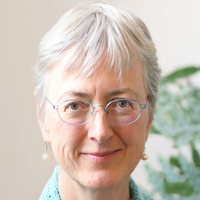
Thomas Harms is working as Psychologist, Bodypsychotherapist and Trainer in Bremen. He is Director of the Centre for Primary Prevention and Bodypsychotherapy (ZePP). In his work he is specialized in the bodypsychotherapy with parents and infants with traumabased Attachment-Disorders.
Speakers
Luisa Barbato
The new symptoms as expression of emptiness
New symptoms and disorders can be defined as symptoms of modernity and can be classified in three main categories: depressions, addictions and panic attacks. But what ties together these new symptoms? What is their common denominator? We can define them like symptoms of emptiness as they are united by the taboo of death, of ego fragility and of human fallibility. We then also have energy loss and rarefaction, due to the absence of places for processing separations, mourning, life failures etc, so the individual and social systems are fragmented. We can say we live in a border-line social age with such an acceleration of individual and collective time and space as to provoke a dicrease in energy. The loss and rarefaction of energy have to be integrated in our diagnostic „maps“ within the modern bodypsychotherapy.

Luisa Barbato
is a certified Reichian body psychotherapist and a member of the Board as well as supervisor of SIAR (Italian Society of Reichian Analysis). She works as a body-psychotherapist in Rome in private and public Institutions with individual and groups therapies.
She is the director of the Scientific Committee of AIPC (Italian Association of Body Psychotherapy). She was elected member of the Italian Board of Professional Association of Psychologists and she is a member of the Executive Committee of the Forum of European accredited body-psychotherapy training institutes. She teaches body-psychotherapy in numerous Italian post-graduate schools of psychotherapy.
Regina Hochmair
Burn-out and lost relation to the Self
Biopsychosocial conditions can cause Burnout. Affected Burnout- Patients are confronted roughly with themselves. With the use of the life energy the set achievement ideal was exceeded. Self-exploitation cannot be ignored anymore.
The understanding of pulsation and the application of nonverbal techniques as Functional analyses or other Bodypsychotherapy methods originated, vitalize those who ended in fear and depression.
Those approaches rooting in a Reichian tradition are consolatory offerings for those patients who got lost in their own mirror image. With therapeutic support they find back home to themselves. A crucial impact for this process got the concept of Instroke.

Regina Hochmair
is a specialist in general medicine (Germany). Dr. Hochmair aquired the PSY-Diploma (psychosocial, psychosomatic and psychotherapeutical medicine) of the Austrian Medical Assosication and graduated at Masters of behavioural therapy. She teaches in the Curriculum of the AABP.
Since 1988 Dr. Regina Hochmair works parallel to her medical career as bodytherapist following Wilhelm Reich. Dr. Hochmair is trained in Radix and Functional Analyses. 1993 she built up a bodypsychotherapeutical practice in Vienna.
Since March 2006 Dr. Regina Hochmair is involved in the build up of a department especially for people with burnout symptoms at the Clinic Pirawarth near Vienna, Austria as the head of the integrated psychosomatic department.
Marianne Bentzen
A model of emotional maturity: skill levels instead of issues
Emotional maturity is the result of the development and integration of three universal aspects of psychological-mindedness. By assessing these developmental aspects in a case example, we will see how to find the most effective intervention level for trauma or character issues.
We will distinguish the life skills at these three levels:
Embodiment: our basic experience of life-energy, feelings and togetherness.
Symbolisation: our ability to get emotionally ‘unstuck’, take different perspectives, and bring our insights from one context to another.
Mentalisation: last to develop, the art of ‘seeing ourselves from the outside and others from the inside’

Marianne Bentzen
is a Bodypsychotherapist and author. A Bodynamics trainer 1985-97, from 1998 she and psychologist Susan Hart have charted a cradle-to-grave overview of neuroaffective personality development (NAPD). Marianne’s work spans psychomotor development, developmental neuropsychology, trauma treatment, evolutionary psychology and systems approaches. A long-time meditator, she also brings a spiritual perspective to her work.
Eva Kaul
Burned-out by the obsession to feel good
In the past fifty years, we experienced the transition from a disciplinary-based society restricting personal freedom by traditional rolls and imperatives to a meritocracy with its inherent necessity of social and professional achievement. Social change is mirrored by psychic symptoms such as the burnout syndrome. Its emergence can be attributed to the dynamic interaction of society, workplace, and personality. The syndrome itself represents a risk factor for miscellaneous psychic and physical illnesses. For the medical diagnosis and treatment of the burnout syndrome, a multidimensional approach is suitable including body experience, emotions, cognitions, socio-cultural environment, as well as personal values and spirituality.

Eva Kaul
MD, Internal Medicine FMH, psychosomatic and psychosocial medicine SAPPM, Bodypsychotherapist in private office (Integrative Body Psychotherapy IBP, Egostate-Therapy, ACT, Life Span Integration), Teacher and Supervisor in IBP, Zen-Student of Willigis Jähre and André Dayu Steiner.
